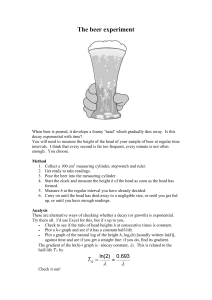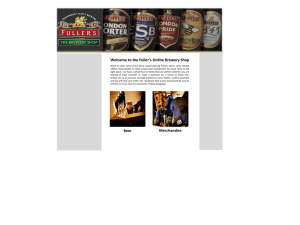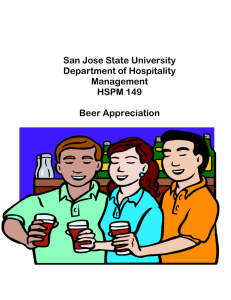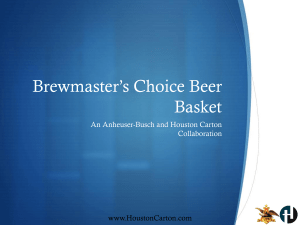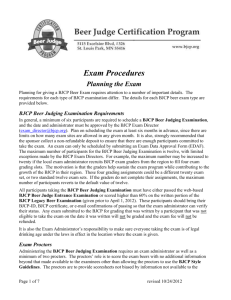Section 1 - San Jose State University
advertisement
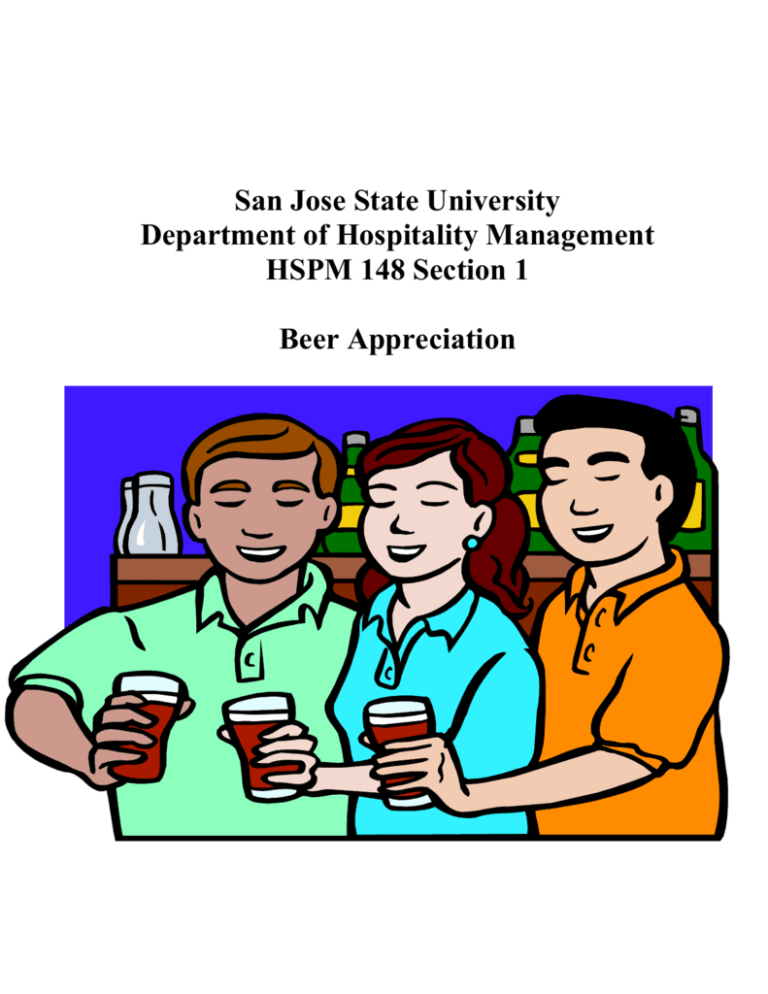
San Jose State University Department of Hospitality Management HSPM 148 Section 1 Beer Appreciation Instructor: Dr. Kate Sullivan, Professor (call me Dr. Kate) Office Location: SSC 400-26 Telephone: 408-924-3201 Email: kate.sullivan@sjsu.edu Office Hours: by appt. Class Days/Time: Tuesdays and Thursdays 5:30-9:15 pm Classroom: BBC 202 Prerequisites: Must be 21 years of age by June 3, 2014 Proof of age required by first class Course Fees: Possible field trip fees Student fees already paid will cover cost of tastings. COURSE DESCRIPTION An examination of the history, community and business of beer in hospitality management, from its international brewery markets to the small craft beer distributors. Comprehension of beer styles, regions, brewing processes and food pairings will be explored through weekly tastings and sensory applications of the principles of beer making as well as the examination of the economic impact of beer on the hospitality industry. COURSE OBJECTIVES: This course is designed to develop or refine your: 1. use of brewing vocabulary in order to effectively describe the various styles of beer to guests and/or employees; 2. application of the principles of sensory perception; 3. ability to evaluate beer and understand the judging process; 4. comprehension of beer style guidelines and ability to distinguish among major styles; 5. insight into the history of brewing; understanding global beers 6. knowledge of grains, malt, and adjuncts; 7. insight into the brewing process, including fermentation and packaging; and 8. understanding of the BJCP, including its mission, judging levels, and methods of advancement. Required reading: Tasting Beer Randy Mosher (2009) Storey Press ISBN 9781603420891 Spartan Bookstore Digital Versions of the book can be acquired through Apple and Android Markets. This book is also available at Barnes and Noble. This course will follow the guidelines of the Beer Judging Certification Program (BJCP) in preparing students to take the BJCP examination. The BJCP Beer Judge Exam process is how a beer enthusiast becomes a beer judge in the BJCP. This examination is a three-hour evaluation of participants’ brewing knowledge. The exam covers these topics: 1. Technical aspects of brewing, ingredients, brewing process and possible faults. 2. World beer styles, including characteristics, history, ingredients and brewing techniques. 3. The purpose of the BJCP and the criteria for the judging ranks. 4. Judging procedures and ethics. The BJCP Beer Judge Exam was revised in March 2012, and now consists of three exams: o o o The BJCP Beer Judge Entrance Examination, an online examination to screen prospective candidates. The BJCP Beer Judging Examination, a practical tasting examination of six beers. The BJCP Beer Judge Written Proficiency Examination, a written examination consisting of 20 True-False and five essay questions used to test skills and knowledge necessary for higher ranks. Go the BJCP.org for more details. You are not required to take the exam in this class. Final total percentage range and letter grade: Point Range. 96 – 100. 93 – 95. 90 – 92. 86 – 89. 83 – 85. 80 – 82. 76 – 79. 73 – 75. 70 – 72. 66 – 69. 63 – 65. 60 – 62. 59 and below. Grade. A+. A. A-. B+. B. B-. C+. C. C-. D+. D. D-. F. COURSE REQUIREMENTS 1. Quizzes There will be weekly in class and on line quizzes covering material discussed the previous week and from the readings and videos. These will consist of True and False, multiple choice, and short answer questions. There will be 6 quizzes total. Quizzes cannot be made up. You can drop the lowest. 2. Tasting Notes You will develop an online Tasting Notebook, compiled of complete tasting notes of all beverage alcohol evaluated during the semester. This project is ongoing but due on the last day of class. Any notes submitted after that date will be graded down 25%. See Project Guidelines in this syllabus. You must follow these guidelines exactly. You must only use the SJSU Beer Score Sheets in the notebook. The SJSU Beer Score sheets are located on the class Canvas page. We will taste a minimum of 40 beers throughout the semester. Therefore, it is your responsibility to print out tasting forms then scan them or electronically utilize them as we taste during each class. The total package must be finished by July 3rd. 3. Class project – You and a partner will select one region from around the globe and present to the class the overview of the region, its geography for growing grains and hops, its beer history, beer celebrations and festivals, beer production, importation and exportation, beer laws, and other pertinent points to be distributed in class. Presentation is 15 minutes per group and each person on the team of 2 must present. Visuals and tastings are expected. 4. Field Trips: We will be visiting at least two local breweries during class time. 4. Final Examination This is a on line and in class tasting exam. There will be no exceptions. It will involve tasting first then an online comprehensive final. COURSE ORGANIZATION 1. Each class period is divided into three sections: (1) quiz, (2) lecture/videos, and (3) tasting. 2. California law requires a minimum age of 21 for consumption of beverage alcohol. You must furnish proof of age on the first day of class. 3. The Department will not provide plastic glasses for the tastings. Part of your participation points will require you to go out and purchase a clear glass tasting glass. 3-4oz is required and should be brought to class. A sample glass will be available to see during class. 4. We will taste beverages every week. You are expected to maintain SJSU Beer Score Sheets on all products tasted. These tasting notes will form the Tasting Notebook project. 5. Water pitchers and buckets will be provided for rinsing glasses and for discarding unconsumed products. I recommend that you do not consume all beverage alcohol that is placed in front of you. You should drink the minimum needed to effectively evaluate the beer. This is typically less than 2 oz. 6. The classroom must be left clean after the tastings. SJSU Beer Appreciation Summer 2014 Tasting Notebook Guidelines Due: Thursday, July 3 online. Contents: All tastings from June 3 through July 3rd, 2014. SJSU Beer Score Sheets must be used. These can be found on Canvas. Extra Credit: Tasting notes of other fermented beverage alcohols tasted outside of class will be considered for extra credit – up to a maximum of 20 points. Place the tasting notes together, in one section, at the end of the notebook and label it Extra Credit. Organization: Suggested that you complete weekly and add to Canvas. Neatness: The tasting notes need not be typed but they must be legible and readable. If you write like I do, I would advise you to print. If your printing is not so hot, type it. Quality: I expect to see evidence that, over the course of the semester, your ability to perceive and to describe these perceptions has improved. This, along with some evidence that you are perceiving something is what I look for. Higher grades for those who demonstrate knowledge. Notebook Format: Tasting notes must be scanned in PDF or Word format and submitted on Canvas weekly beginning, Thursday, June 5th. Miscellaneous: Do not bother to go to any great lengths to make it fancy and splashy. If you want this for your own gratification and satisfaction - fine, but I pay no attention to it and it has no effect on your grade. Messy does - I will always reduce the grade for messy and hard to read materials. I also expect whatever terms you use to be spelled correctly; grammatical usage is not usually a factor with tasting notes. Dropping and Adding Students are responsible for understanding the policies and procedures about add/drop, grade forgiveness, etc. Refer to the current semester’s Catalog Policies section at http://info.sjsu.edu/static/catalog/policies.html. Add/drop deadlines can be found on the current academic calendar web page at http://www.sjsu.edu/provost/Academic_Calendars/. The Late Drop Policy is available at http://www.sjsu.edu/aars/policies/latedrops/policy/. Students should be aware of the current deadlines and penalties for dropping classes. Information about the latest changes and news is available at the Advising Hub at http://www.sjsu.edu/advising/. Assignments and Grading Policy (Insert your enumerations and brief descriptions for the course assignments here, and indicate how each assignment is aligning with the learning outcomes. Include information about due dates and assignment weights. Specify grading policies including how grades are determined, what grades are possible, whether extra credit is available, what the penalty is for late or missed work, and what constitutes a passing grade for the course. Include the date of the final exam/s. If you grade on participation, indicators on how participations will be assessed should be included. Attendance per se shall not be used as a criterion for grading according to Academic Policy F-69-24 located at http://www.sjsu.edu/senate/F69-24.pdf. ) University Policies Academic integrity Your commitment as a student to learning is evidenced by your enrollment at San Jose State University. The University’s Academic Integrity policy, located at http://www.sjsu.edu/senate/S07-2.htm, requires you to be honest in all your academic course work. Faculty members are required to report all infractions to the office of Student Conduct and Ethical Development. The Student Conduct and Ethical Development website is available at http://www.sjsu.edu/studentconduct/. Instances of academic dishonesty will not be tolerated. Cheating on exams or plagiarism (presenting the work of another as your own, or the use of another person’s ideas without giving proper credit) will result in a failing grade and sanctions by the University. For this class, all assignments are to be completed by the individual student unless otherwise specified. If you would like to include your assignment or any material you have submitted, or plan to submit for another class, please note that SJSU’s Academic Integrity Policy S07-2 requires approval of instructors. Campus Policy in Compliance with the American Disabilities Act If you need course adaptations or accommodations because of a disability, or if you need to make special arrangements in case the building must be evacuated, please make an appointment with me as soon as possible, or see me during office hours. Presidential Directive 97-03 at http://www.sjsu.edu/president/docs/directives/PD_1997-03.pdf requires that students with disabilities requesting accommodations must register with the Disability Resource Center (DRC) at http://www.drc.sjsu.edu/ to establish a record of their disability. Student Technology Resources (Optional) Computer labs for student use are available in the Academic Success Center at http://www.at.sjsu.edu/asc/ located on the 1st floor of Clark Hall and in the Associated Students Lab on the 2nd floor of the Student Union. Additional computer labs may be available in your department/college. Computers are also available in the Martin Luther King Library. A wide variety of audio-visual equipment is available for student checkout from Media Services located in IRC 112. These items include DV and HD digital camcorders; digital still cameras; video, slide and overhead projectors; DVD, CD, and audiotape players; sound systems, wireless microphones, projection screens and monitors. SJSU Peer Connections (Optional) The Learning Assistance Resource Center (LARC) and the Peer Mentor Program have merged to become Peer Connections. Peer Connections is the new campus-wide resource for mentoring and tutoring. Our staff is here to inspire students to develop their potential as independent learners while they learn to successfully navigate through their university experience. Students are encouraged to take advantage of our services which include course-content based tutoring, enhanced study and time management skills, more effective critical thinking strategies, decision making and problem-solving abilities, and campus resource referrals. In addition to offering small group, individual, and drop-in tutoring for a number of undergraduate courses, consultation with mentors is available on a drop-in or by appointment basis. Workshops are offered on a wide variety of topics including preparing for the Writing Skills Test (WST), improving your learning and memory, alleviating procrastination, surviving your first semester at SJSU, and other related topics. A computer lab and study space are also available for student use in Room 600 of Student Services Center (SSC). Peer Connections is located in three locations: SSC, Room 600 (10th Street Garage on the corner of 10th and San Fernando Street), at the 1st floor entrance of Clark Hall, and in the Living Learning Center (LLC) in Campus Village Housing Building B. Visit Peer Connections website at http://peerconnections.sjsu.edu for more information. SJSU Writing Center (Optional) The SJSU Writing Center is located in Suite 126 in Clark Hall. It is staffed by professional instructors and upper-division or graduate-level writing specialists from each of the seven SJSU colleges. Our writing specialists have met a rigorous GPA requirement, and they are well trained to assist all students at all levels within all disciplines to become better writers. The Writing Center staff can be found at http://www.sjsu.edu/writingcenter/about/staff/. HSPM 148 Section 3 Beer Appreciation Table 1 Course Schedule Class Date/Read 6/3 Chapter 1 and 2 6/3 6/5 6/10 6/12 Quiz 1 Chapter 4 6/19 6/24 6/26 Presenting beer- temperature, pouring, glassware, color American craft beers Field trip Online Quiz2 Chapter 7 Field trip to Hermitage Brewery (7th and Phelan) Tied House Quiz 3 Chapter 9 continued Quiz 4 online Chapter 10 Chapter 11 Beer and Food Pairings; German beers, purity laws Tasting of German beers British Ales Tasting of British ales Irish and Scottish ales Field trip Gordon Biersch Continental Ales, Weissbiers, and ale-lager hybrids Chapter 12 The beers of Belgium Quiz 5 Chapter 13 The Business of Beer Craft beers around the world 6/28 7/1 Welcome to SJSU’s second Beer Appreciation class! History of American Beer/video History of beer continued; how beer built America Sensory Vocabulary and Evaluations; The Flavor Wheel; how to taste (handout) Fermentation/Brewing Tasting of 5 American Beers Serving safely, DUI troubles, AA, and dramshop laws Fermentation and Brewing continued; the qualities of beer Tasting of American IPAs Chapter 6 Chapter 9 6/17 Topics, Readings, Assignments, Deadlines Field trip Anchor Steam Brewery Quiz 6 Presentations/ tasting final Class 7/3 Date/Read Topics, Readings, Assignments, Deadlines Final Exam- in class written test exam On lineTasting notebooks due
